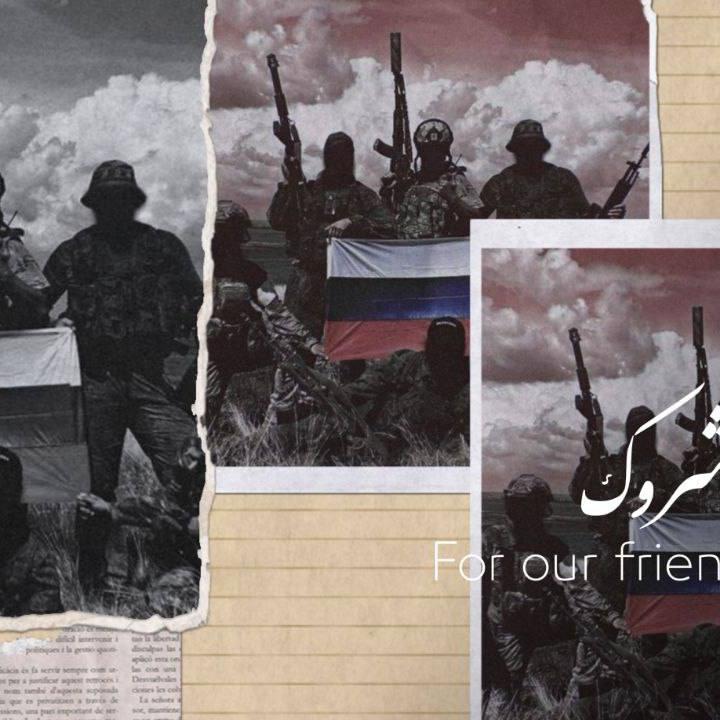
The Militia-Russia Love Affair: April 2023 Update

Iraqi militia officials are still regularly praising Putin's invasion of Ukraine and even conferring honorary Shia Muslim status on Russian officials.
In March 2022, Militia Spotlight highlighted the major expansion of Russia's ties with Iraq's Iran-backed "resistance" (muqawama) groups since the outset of the Ukraine invasion. Another Spotlight article in January 2023 profiled Moscow's hosting of U.S.-designated terrorists and human rights abusers from the overlapping leadership of the muqawama and Iraq's Popular Mobilization Forces (PMF).
More than a year after the Ukraine invasion, muqawama platforms are still very actively promoting Russian propaganda. On April 22, for example, one of their leading Telegram channels, Sabereen News, released a song cheering for Russian Wagner mercenaries. The song's title, "Shrouq wild Shrouq," invokes the term "Shrougi," literally "people who come from the East," often used to describe the Shia of southern Iraq. Although "Shrougi" can be used as a derogatory term (particularly against "Marsh Arabs" and their urban descendants), some southern Iraqi Shia have reclaimed it as a sign of social pride, especially in the post-Saddam era. In other muqawama social media posts, the term has been used to describe figures such as Qais al-Khazali (leader of the militia Asaib Ahl al-Haq) and Prime Minister Mohammed Shia al-Sudani (whom the muqawama view as a largely useful subordinate). Hence, describing Wagner mercenaries as "Shrougi" is essentially a way of saying "they are one of us."
The song is delivered in a southern Iraqi accent and glorifies the Russian group for its operations in Syria and Ukraine. It is also worded as if the group is an extended part of the Shia community.
Moreover, when reporting on the Ukraine invasion, muqawama social media tend to target the Shia community, especially tribal audiences. For example, Sabereen has described Wagner commander Yevgeny Prigozhin as "Hajji Yevgeny" (Figure 1), using the honorific typically reserved for senior figures who have completed the Hajj pilgrimage (e.g., Hadi al-Ameri and Nouri al-Maliki from the Coordination Framework, the body that oversees muqawama political factions).
Their social media accounts also have a habit of using the phrase "Great Russia" (Rusia al-Udhma). For example, the muqawama Telegram channel Tura News has described the Russian Defense Ministry as "the Ministry of Defense of Great Russia." In contrast, it referred to Ukraine's leader as “the Jewish President” in an effort to degrade him in the eyes of Iraqi viewers (Figure 2).
Regarding Putin himself, muqawama media are still fascinated by his perceived personality as a strongman. They even use a religion-related nickname for him (Abu Ali) to make him more appealing to the Shia public.
Elsewhere, the Coordination Framework has been highly critical of UN special representative Jeanine Plasschaert and U.S. ambassador Alina Romanowski for meeting with Iraqi officials, but never criticizes the Russian ambassador for such engagement. In fact, Sabereen News described him as a friend of the muqawama, while Hadi al-Ameri symbolically invited him for an iftar meal on April 16 alongside representatives from Islamic countries (Figure 3).
Such behavior shows that the Framework is increasingly treating Russia not only as a political ally, but as an ideological one as well. Militia leaders were even willing to criticize the so-called "muqawama government" of Prime Minister Sudani for voting in favor of the UN's February resolution against Russia’s Ukraine invasion. For example, Hussein Moanes, head of Harakat Hoquq (Kataib Hezbollah's parliamentary front), complained, “What is the benefit that Iraq will gain in voting against Russia in the United Nations? The chaos of foreign policy is far from balanced. There is no truth in talking about impartiality” (Figure 4).
Similarly, Hassan Salim, a member of parliament from al-Sadiqoun (Asaib Ahl al-Haq's bloc) tweeted, “Our Ministry of Foreign Affairs with its random politics and blundering decisions is dragging Iraq to the crisis of war and conflicts through its voting on an international resolution condemning Russia” (Figure 5).
That same month, the group Harakat Hezbollah al-Nujaba lavished Moscow with praise after Foreign Minister Sergei Lavrov's February 5 visit to Iraq. Firas al-Yassir, a member of the group's political bureau, tweeted: “The Russian delegation of the 65 members came to Iraq...to lift the suffocation from Iraq and present the files of energy and food security. Iraq has an opportunity to open up to the world and diversify its economy and get rid of the U.S. sanctions. We need brave political decisions that are at the level of responsibility” (Figure 6).








